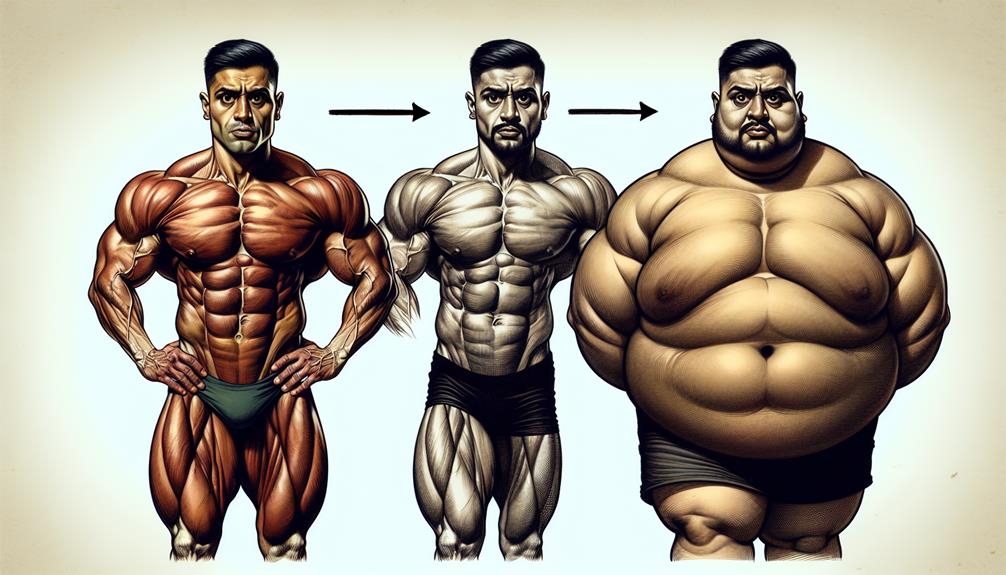When it comes to bodybuilding, there are many common beliefs that might not be entirely accurate. You've probably heard some of these myths before, but have you ever wondered if they hold any truth? Let's shed light on some of these misconceptions and uncover the reality behind them. From the role of protein intake to the myth of muscle turning into fat, there's a lot to unpack when it comes to separating fact from fiction in the world of bodybuilding.
Key Takeaways
- Protein timing matters less than daily intake for muscle growth.
- Cardio and weightlifting both offer unique health benefits.
- Muscle and fat are distinct tissues that don't convert into each other.
- Spot reduction is a myth; focus on overall fat loss through exercise and diet.
Protein Intake Misconceptions
To maximize muscle growth and recovery, it's crucial to understand the truth about protein intake and dismiss the common misconceptions surrounding it. Protein timing plays a significant role in muscle development. The idea that you need to consume protein immediately after a workout to maximize gains is a common misconception. While it's essential to refuel your body after exercise, research suggests that the overall protein intake throughout the day is more critical than an immediate post-workout shake. Your body can absorb and utilize protein effectively over the course of the day, so focus on spreading your protein intake across meals rather than fixating on a narrow post-workout window.
Moreover, absorption rates of different protein sources vary. Whey protein, for example, is rapidly absorbed, making it an excellent choice for post-workout nutrition. On the other hand, casein protein is slower to digest, making it a suitable option before bedtime to provide a steady release of amino acids throughout the night. By understanding protein timing and absorption rates, you can optimize your muscle growth and recovery effectively. Remember, consistency in your protein intake and overall diet is key to achieving your bodybuilding goals.
Cardio Vs. Weight Training
Engage in both cardio and weight training to optimize your fitness journey and achieve well-rounded health and strength. Cardio exercises, such as running, cycling, or swimming, offer numerous benefits. They improve cardiovascular health, increase endurance, and aid in weight loss by burning calories. Regular cardio sessions also boost mood and reduce the risk of chronic diseases like heart disease and diabetes. On the other hand, weightlifting benefits include building muscle mass, increasing metabolism, and enhancing overall strength. Strength training helps sculpt your physique, improve bone density, and support joint health. Combining both forms of exercise creates a balanced routine that targets different aspects of fitness. Cardio helps with fat loss and cardiovascular fitness, while weight training builds lean muscle mass and strength. Incorporating both into your workout regimen will not only maximize your results but also keep your workouts exciting and varied. Remember, balance is key to reaching your fitness goals and maintaining a healthy lifestyle.
Muscle Turned Fat

Maximizing your fitness efforts also involves debunking the common misconception that muscle can turn into fat. When it comes to your body composition, understanding the dynamics between muscle gain and fat loss is crucial for achieving your fitness goals. Here are some key points to consider:
- Muscle Gain: Building muscle through resistance training is a highly effective way to boost your metabolism. Muscle tissue is metabolically active, meaning it burns more calories at rest compared to fat tissue. As you increase muscle mass, your body requires more energy to maintain these muscles, leading to an elevated resting metabolic rate.
- Metabolism Impact: Unlike muscle, fat tissue is not metabolically active. Therefore, losing muscle mass can slow down your metabolism, making it easier to gain fat if your calorie intake remains high. It is essential to maintain muscle through proper strength training and a balanced diet to support a healthy metabolism and prevent fat gain.
- Body Composition: Remember, muscle and fat are two distinct types of tissue and cannot transform into each other. By focusing on strength training to build muscle and incorporating cardiovascular exercise for overall health, you can optimize your body composition and achieve long-term fitness success.
Spot Reduction Fallacy
Don't fall for the myth of spot reduction when it comes to losing fat and shaping specific areas of your body. Targeted training or focusing solely on one body part to lose fat from that area is a common misconception. The truth is, fat loss techniques involve a more holistic approach. While it's natural to want to tone specific areas, like your abs or arms, fat is lost systematically throughout the body.
To effectively reduce fat in certain areas, you need to focus on overall fat loss. This includes a combination of cardiovascular exercise, strength training, and a balanced diet. By engaging in full-body workouts that target multiple muscle groups, you can boost your metabolism and burn more calories, aiding in fat loss.
Overtraining Dangers
Avoid the pitfalls of overtraining by listening to your body's signals and incorporating sufficient rest into your workout routine. Overtraining can hinder your progress and lead to injuries, so it's crucial to prioritize recovery and pay attention to the signs your body gives you. Here are some key points to consider:
- Recovery Importance: Make sure to prioritize recovery just as much as your training. Rest days, sleep, and proper nutrition are essential for muscle repair and growth.
- Training Frequency: Be mindful of your training frequency. Training too often without adequate rest can increase the risk of overtraining.
- Signs and Prevention of Overtraining: Watch out for signs like persistent fatigue, decreased performance, mood swings, and increased risk of injuries. To prevent overtraining, vary your workouts, listen to your body, and schedule regular deload weeks to give your body a break.
Supplement Dependency
Prioritize your nutrition and training consistency to minimize the need for excessive supplement dependency in your bodybuilding journey. While supplements can be beneficial, relying too heavily on them can be costly and unnecessary. Instead, focus on whole foods that provide essential nutrients for muscle growth and recovery. Supplement alternatives such as protein-rich foods like chicken, eggs, and Greek yogurt can be just as effective in supporting your fitness goals.
Embrace the power of natural muscle growth by optimizing your diet with lean proteins, complex carbohydrates, healthy fats, and a variety of fruits and vegetables. These whole foods not only supply your body with vital nutrients but also promote overall health, energy levels, and performance in the gym. Remember, supplements should complement your diet, not replace it.
Frequently Asked Questions
Is It True That Lifting Weights Will Make Women Bulky?
Lifting weights won't make you bulky; it enhances muscle definition and boosts strength. Embrace strength training to sculpt a lean, toned physique. Your body will become stronger, more defined, and healthier with consistent weightlifting.
Can You Turn Fat Into Muscle by Simply Working Out?
You can't turn fat into muscle by just working out. It's like trying to turn apples into oranges. Caloric balance and genetics play a role in fat loss and muscle building. Understand your metabolism.
Is It Possible to Target Specific Areas for Fat Loss Through Exercise?
You may believe spot reduction is possible, but reality check: targeting specific areas for fat loss through exercise is an exercise misconception. Body fat decreases overall through a combination of diet, cardio, and strength training.
How Do You Know if You Are Overtraining and What Are the Risks?
Feeling depleted, failing to progress, and experiencing constant fatigue are signs of overtraining. Pay attention to your body's signals. Optimal performance indicators include consistent gains, energy levels, and motivation. Implement proper recovery strategies and adjust training intensity accordingly.
Do I Need to Take Supplements to See Results in My Bodybuilding Journey?
You don't need supplements to excel in bodybuilding. Focus on nutrition importance and allow your body to make natural progress. Whole foods, adequate protein, and balanced macros can fuel your journey effectively.
Conclusion
As you continue your fitness journey, remember to stay informed and separate fact from fiction. Don't let myths hold you back from reaching your goals. Keep pushing yourself in the gym, fueling your body with the right nutrients, and listening to your body's needs. You have the power to sculpt your body and achieve your desired physique. Stay focused, stay determined, and watch as your hard work transforms you into the best version of yourself.













